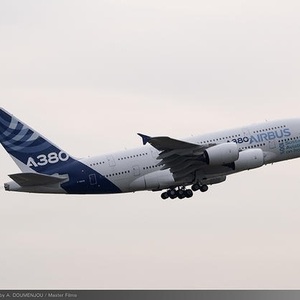Airbus: First A380 powered by 100% SAF takes to the skies

SOURCE: Airbus
March 29, 2022
BY Airbus
Airbus has performed a first A380 flight powered by 100 percent sustainable aviation fuel (SAF).
Airbus’ A380 test aircraft MSN 1 took off from Blagnac Airport, Toulouse, France at 08h43 on March 25. The flight lasted about three hours, operating one Rolls-Royce Trent 900 engine on 100 percent SAF.
Twenty-seven metric tons of unblended SAF were provided by TotalEnergies for this flight. The SAF produced in Normandy, close to Le Havre, France, was made from hydroprocessed esters and fatty aids (HEFA), free of aromatics and sulphur, and primarily consisting of used cooking oil, as well as other waste fats. A second flight, with the same aircraft, is scheduled to take place from Toulouse to Nice Airport, on the March 29 to test the use of SAF during take-off and landing.
Advertisement
This is the third Airbus aircraft type to fly on 100 percent SAF over the course of 12 months; the first was an Airbus A350 in March 2021 followed by an A319neo single-aisle aircraft in October 2021.
Increasing the use of SAF remains a key pathway to achieving the industry’s ambition of net-zero carbon emissions by 2050. Key statistics outlined in the Waypoint 2050 report indicate that SAF could contribute between 53 percent and 71 percent of required carbon reductions.
Advertisement
All Airbus aircraft are currently certified to fly with up to a 50 percent blend of SAF mixed with kerosene. The aim is to achieve certification of 100 percent SAF by the end of this decade.
The A380 aircraft used during the test is the same aircraft recently revealed as Airbus’ ZEROe Demonstrator - a flying testbed for future technologies instrumental to bringing the world’s first zero-emission aircraft to market by 2035.
Related Stories
The Michigan Advanced Biofuels Coalition and Green Marine are partnering to accelerating adoption of sustainable biofuels to improve air quality and reduce GHG emissions in Michigan and across the Great Lakes and St. Lawrence Seaway.
EIA reduces production forecasts for biobased diesel, increases forecast for other fuels, including SAF
The U.S. Energy Information Administration reduced its 2025 forecasts for renewable diesel and biodiesel in its latest Short-Term Energy Outlook, released April 10. The outlook for “other biofuel” production, which includes SAF, was raised.
FutureFuel Corp. on March 26 announced the restart of its 59 MMgy biodiesel plant in Batesville, Arkansas. The company’s annual report, released April 4, indicates biodiesel production was down 24% last year when compared to 2023.
Neste has started producing SAF at its renewable products refinery in Rotterdam. The refinery has been modified to enable Neste to produce up to 500,000 tons of SAF per year. Neste’s global SAF production capacity is now 1.5 million tons.
Tidewater expects to make final investment decision on proposed SAF project during second half of 2025
Tidewater Renewables Ltd. has reported that its biorefinery in Prince George, British Columbia, operated at 88% capacity last year. A final investment decision on the company’s proposed SAF project is expected by year end.
Upcoming Events










